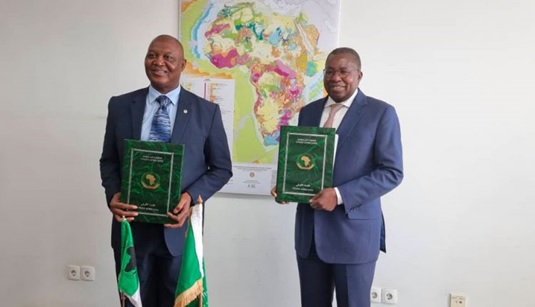
COMPILED BY MENGISTEAB TESHOME
In the last five years, the share of Africans who choose to buy goods and services online has more than doubled; that’s about 10 percent of the entire population on the continent. And while this shift has resulted mainly from the pandemic, it’s becoming clear that even as economies return to a semblance of ‘normal,’ online sales are here to stay.
The market opportunity for African businesses here is significant. Online sales in Africa are growing at around 25 percent, year-on-year – one of the highest rates in the world – with more than 10 million people starting to buy online each year. Yet online sales in most organizations are only at the beginning of their growth trajectory.
While large organizations have transitioned their sales and operations digitally and have the necessary infrastructure to make this shift, only a small number of businesses have scaled digital sales as yet. We can see this in the numbers. In Europe, the digital sales landscape is so competitive that banks will pay, on average, about 25 percent of profit per client to attract a client. However, in Africa, competition still needs to be higher so that banks can attract clients, spending at most 10 percent of the profit on that client. However, this is unlikely to last.
As the window of opportunity continues to open for digital sales on the continent, we can expect competition for banks, retail, telecoms, logistics, and more, to intensify in the race to develop their digital business and move their service offerings online.
To pull ahead, here are five fundamental principles that African businesses could consider to develop a robust digital marketing function and claim their space at the vanguard of the digital sales frontier.
Engage global expert knowledge Global advertising and social media platforms such as Google, Bing, and WhatsApp are disproportionately dominant across Africa. Tapping into the expertise of international specialists working with these channels will be critical.
For example, in South Africa, the share of search queries on Google is 94%, followed by Bing at 5.12%. Google dominates the search market in Nigeria and Kenya, too, at 98.6% and 97.7%, respectively, according to Global Web Index (GWI) digital marketing research for African countries. Among social media platforms, WhatsApp is the most popular for networking at 93.2% in South Africa, 93% in Nigeria, 96.5% in Kenya, 83.9% in Ghana, and 73.7% in Morocco, usually followed by Facebook, Instagram, and YouTube.
Investing in developing proprietary teams of digital customer acquisition specialists that understand these channels is likely to be a critical competitive edge. Fortunately, as remote working formats have become more common following the pandemic, recruiting global talent has become easier for African organizations. Recruiting talented employees is essential, given that there can be a need for more specialist skilled workers in African countries.
Even though they are working mainly through global channels, African businesses ignore the local context at their peril, especially if they want to scale across the continent.Each African market has subtle differences in consumption and channel behavior that must be considered when planning digital marketing campaigns.
For example, in South Africa, PCs and tablets register higher engagement than smartphones, and time spent daily with desktops, laptops, and tablets rose to a remarkable 5 hours and 25 minutes on average in 2021. South Africa also registers high laptop/desktop ownership (83.3% of the population) compared with most other African countries. This high concentration of internet and social media users, coupled with device penetration, makes it imperative to leverage paid and organic search, social, and display advertising as effective means to reach consumers.
By contrast, Nigeria boasts high smartphone penetration (99.2%) and the highest number of absolute internet users in Africa; 82.9 percent of internet users aged 16-64 said they used social media as the primary source when researching brands. WhatsApp and Facebook can be leveraged with chat support call-to-action functionality alongside Google search to deliver instant and more tailored messaging and one-to-one services to impact that context.
While global advertising platforms create unparalleled opportunities to grow the customer base, there is potential to promote local business growth by interacting with customers on owned channels. For example, businesses could consider using mobile apps, websites, email, and social media groups or messengers to deliver targeted information and improve conversion rates. The key to unlocking these channels could be growing relevant engagement with customers.
Digital marketing deals primarily with business mathematics, where it is necessary to calculate how much each user action costs: a click, an application, or a sale. Once a business learns to measure key metrics, it becomes possible to manage channels and campaigns using these precise metrics efficiently.
To build reliable analytics, organizations could consider setting up effective data tracking and storage systems and ensuring regular reporting to give everyone involved a clear picture of digital sales status. It is equally vital to build cross-functional teams that include analysts so all participants can access data at any time and use this effectively to leverage customer insights to drive further sales.
The main principle of digital marketing is to regularly generate, test, and evaluate the efficiency of new ideas. These may relate to working with new channels, launching further communications and formats for creative solutions, and trying new audiences. The secret of success lies in the organization of a well-coordinated team and reliable processes allowing regular testing.
While there is a common misconception that only digital native organizations – such as neobanks – can be successful in this game. Our experience working with more traditional banking, telecoms, and retailers suggest that digital transformation is within the grasp of all businesses. And given the tremendous growth at stake, this is not something to sit on the fence about.
The main thing is to make going digital a strategic priority for your business and then work towards consistently building a digital function in the organization, characterized by advanced market competencies and flexible methods of operation. This method could allow you to attract a significant number of customers while achieving a good return on investment in marketing.
To ensure the aspired goal the African Development Bank (AfDB) has signed a $9.73 million grant agreement with the African Union Commission (AUC) to implement Phase 1 of the Upstream Project for Digital Market Development in Africa, the Group confirmed through a press release.
The signing ceremony took place on November 17 at AUC Headquarters in Addis Ababa, Ethiopia. The AUC Commissioner for Economic Development, Trade, Tourism, Industry and Minerals, Ambassador Albert M. Muchanga, and the African Development Bank’s Deputy Director General for the East Africa Region, Abul B. Kamara, signed the agreement on behalf of their institutions.
The African Development Bank’s board of directors approved the grant of 7 million Units of Account (USD 9.73 million) in September this year. The project supports the AUC’s implementation of digital economy projects to enhance a continental single digital market.
It also supports the implementation of the African Continental Free Trade Area and the Digital Transformation Strategy for Africa. The project is the backdrop of the COVID-19-induced recession that exposed several gaps in the African digital economy ecosystem. It addresses these gaps. Phase 1 runs from 2023 to 2026.
It will focus on three main components: digital enablers, digital trade and e-commerce adoption, and support actions. Specifically, the project will help strengthen the frameworks (strategic, policy, regulatory and conceptual) and cross-cutting (gender, climate change and resilience) dimensions for developing Africa’s digital economy.
These frameworks are critical substrates for establishing a single digital market across the African continent by 2030. The project will therefore contribute to implementing digital enablers—universal access to broadband infrastructure, sovereign African cloud, African digital market, etc.—e-commerce and digital trade promotion programs for medium, small and micro enterprises and start-ups.
It will also help to create a conducive ecosystem for digital trust, skills and African experts’ networks. Ambassador Muchanga expressed the AUC’s gratitude to the African Development Bank for its support. He said: “The COVID-19 pandemic underscored the importance of digital technologies and the digital economy as a whole, and in that regard, Africa should think big when it comes to digital development, digital economy and the grand opportunities on integration and economic growth.”
Dr. Kamara said the project would support the implementation of the African Development Bank’s High five priorities as accelerators to achieve Agenda 2063 targets and the continent’s economic transformation to get The Africa We Want.
He added: “It is important to create employment opportunities for millions of young Africans, which is essential for the stability and prosperity of the continent. In addition, the digital transformation of economies offers new opportunities to increase intra-Africa trade and boost economic growth,” as per Space in Africa.
The Ethiopian Herald December 2/2022





